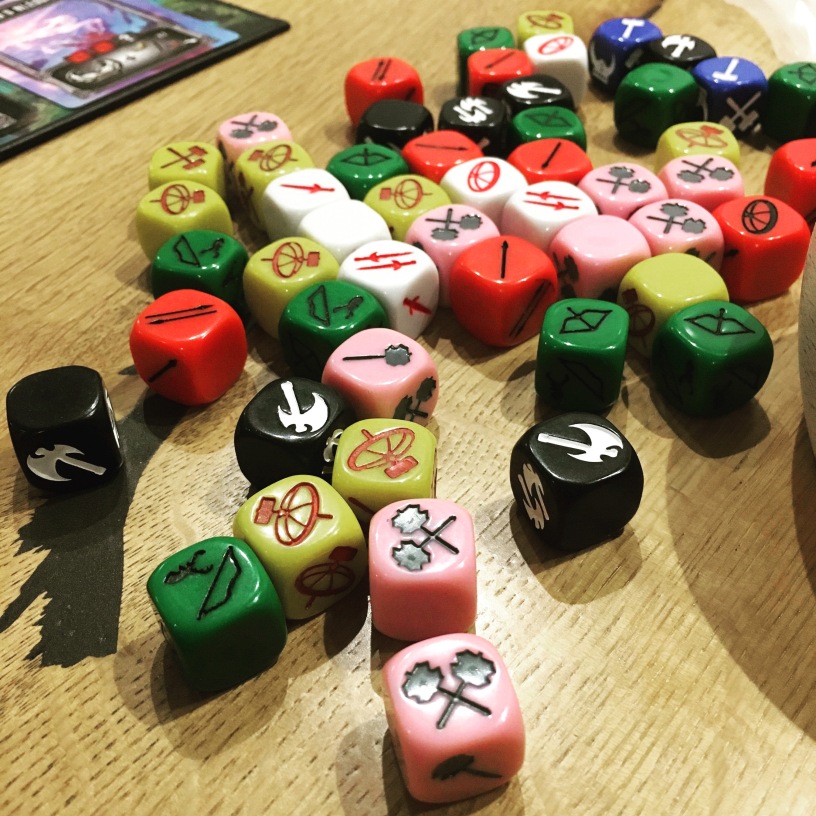Champions of Midgard is a dice fest waiting for gamers to take on epic battles against monsters surrounding a viking village. If you haven’t heard of it, check out my thoughts on the game in my review, but if you are looking for tips on how the game plays and what tactics you might use… look no further
During the game:
Two goals good, three goals bad; This is a highly personal view but I think getting a second goal is helpful and a third is overwhelming. The first two might not be perfect, and hence a third may be necessary but I think you will struggle to really fulfill and emphasize three objective cards at the same time.
Archer, Food, Sea; If the game is tight for food, one way out of the situation is to go after the monsters in the mountains and get an archer. The archer is better at hunting, and so you can expend less dice to hunt well. This can be critical because from the food of the hunt you can then set sail for the high scoring monsters across the sea loaded with food.
Don’t Starve at Sea; Don’t send the boat to see with too little – there are lots of cards that will cost you food, players or a mix. I always try to have one extra food on the boat so that if I have to give up something, it can be a food without further cost. It’s not always possible but it’s a valuable way of avoiding losing a unit.
Losing Units; Of course in battle though you will want to lose vikings. You will have planned to lose specific vikings during the fight in order to trigger the bonuses or get new warriors under the Valhalla rules. It’s a tricky to balance wining the fight with losing some soldiers, but this why the Valhalla rules are so exciting. Losing the right vikings can unlock huge bonus points at the end of the game from the epic monsters in Valhalla!
Monster Fodder; With losing vikings you will want to have fodder – dice you can lose in the fight. The cheap and easy to gain basic dice make for good fodder in the early rounds of the fight. They might be likely to miss, but the fact that they take the first wave of the enemy punches can leave your barbarians and others landing far more hits!
Blame (lots or not at all); Blame is a negative points system that effects all players and it behaves differently in each game. Sometimes, lots of the trolls will be killed and passing blame to other players will have a minimal swing effect 1-4 points. However, if some trolls get through and attack the village then the blame increases across all players and the passing of blame between players can create 10point+ swings in the final round. Plan how you will play the blame game based on how much is out there. Lot’s of blame makes each one more important, whilst low blame games mean your focus should shift elsewhere.
3-4 Sets a Game; Monsters killed can form sets – new players often ask how many they should target to help balance when they attack / how thinly they spread. I would argue 3-4 sets is good for a player in this, and worth targeting for new players.
Get a ship!; The ships look expensive, but interestingly it’s as many points as killing a monster at the end of the game, and it allows you to more consistently go after the monsters over the sea. This is a valuable asset then if built early in the game.
Favours for Points; In the last turn you may find you have collected up many favours of the Gods. These are worth points at the end, but far more if you convert them through the space on the board. Always look at the marginal though – small numbers should be left for game end as your action can score more, but high numbers of favour offer a big points bonus.
First Player; Always a powerful slot in a worker placement, but here it can allow you access to the best dice, the right monster for your set or even just in the early game to get the additional basic viking dice for the end of the round. Lot’s of reasons to grab this and most likely it will rotate each round to the player previously in last.
Good Luck!
